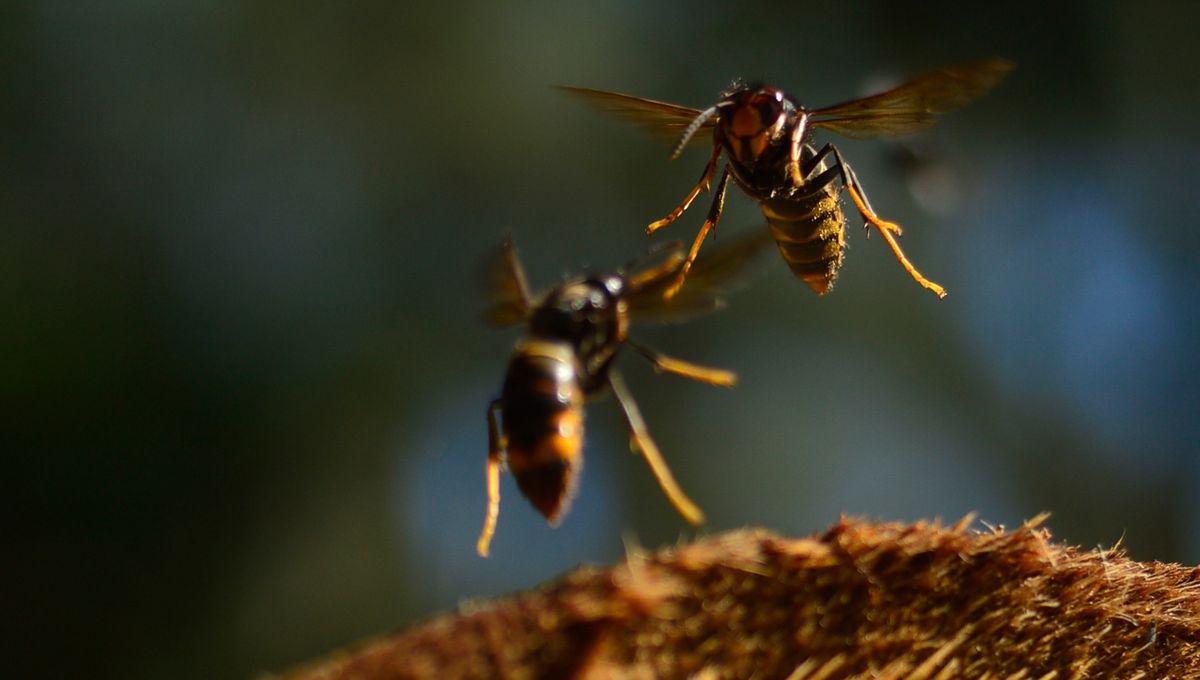
It turns out the buff-tailed bumblebee is buff by name *and* nature, with researchers discovering that it has a surprisingly effective method for fighting off Asian hornets.
In the blue corner
Asian hornets are the menaces of the natural world, having invaded three continents and reaching a record level of sightings across the UK and continental Europe in 2023. They’re not just jet-setting either – they are problematic for the ecosystems that they invade, preying on a wide range of insects, including the very important pollinators, and nabbing their food too.
“Hornets also consume nectar from flowers, meaning they compete directly with bees for food and harass them at flower patches via constant attacks,” said Thomas O’Shea-Wheller, an author of the new study, in a statement. If only there was such a thing as insect restraining orders.
One of their targets is the buff-tailed bumblebee, a social species that’s one of the most common in Europe. It’s easy to think of them as friendly little creatures in comparison to hornets, but when it comes to defending their colonies, scientists from the University of Exeter were stunned to find that they can go full WWE on invaders.
In the red corner
The researchers placed commercially reared buff-tailed bumblebee colonies at 12 locations across Pontevedra, Spain, with varying local numbers of Asian hornets. To capture interactions between the two species, the team fitted out the colonies with automated camera monitoring systems.
Recording over 120 hornet attacks, they were surprised to find that the bumblebees successfully fought off the hornets every time and used a creative method to do so. When a hornet attacked a bumblebee on its way back from foraging, the bumblebee dropped to the ground.
The sudden drop caused the hornet to either lose its grip or they both fell to the floor, giving the bumblebee the opportunity to wrestle until the hornet got fed up and left, like a childhood sibling squabble.
The authors of the study documenting this remarkable defense strategy describe the bumblebees’ success as something of an “evolutionary coincidence”; given the two species did not co-evolve, the bumblebees theoretically shouldn’t have a natural resistance to them.
There’s a twist
Unfortunately, it’s not all good news for the buff-tailed bumblebee, as the Asian hornet still manages to come out on top in the end.
The researchers weighed the bumblebee colonies every two days and found that those in areas with higher densities of Asian hornets grew more slowly. Although they cautioned that the reason for this was still uncertain, they thought it was likely that the presence of the hornet was limiting the success of the colony.
“Although the attacks we witnessed at colony entrances were unsuccessful, bumblebees have been reported in the diet of Asian hornets, and the hornets are known to prey on them elsewhere,” O’Shea-Wheller explained. “Defending against such attacks is likely energetically costly – and when hornet abundance is high, this could be a major problem for bees out foraging.
Hornets are also Hollywood paparazzi level when it comes to harassment of their prey. “They are very persistent and generalist predators, so these attacks may still be worthwhile despite the high failure rate, as long as they sometimes get a kill.”
You win this time, Asian hornet.
The study is published in Communications Biology.
Source Link: Bumblebees' Remarkable Defense Against Invasive Asian Hornets: An "Evolutionary Coincidence"